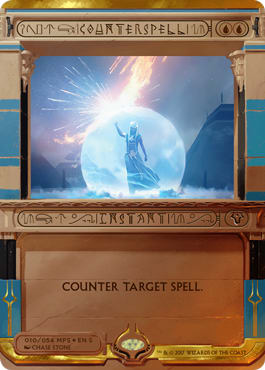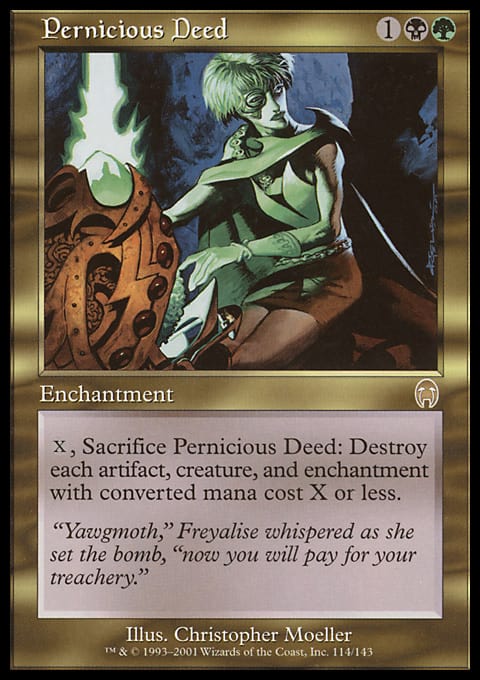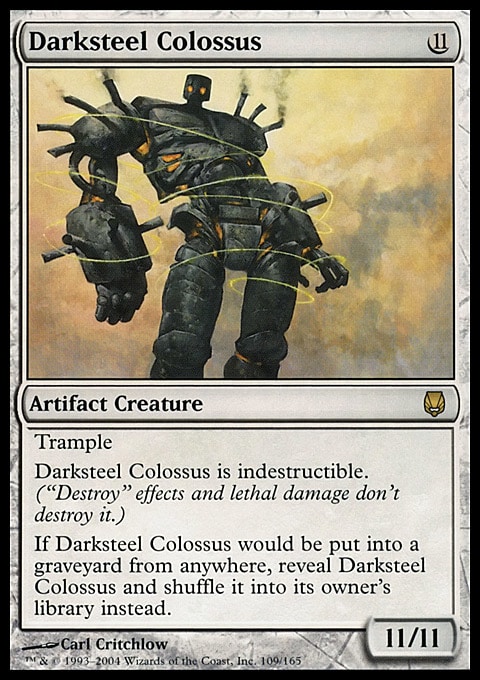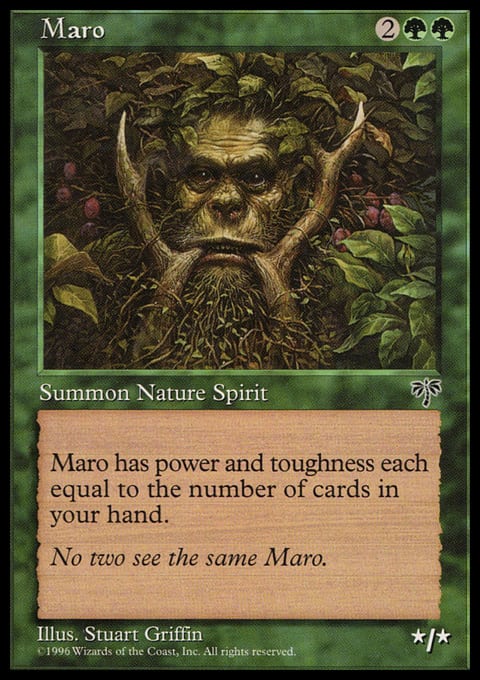I've seen a lot of Commander players recently rocking multiplayer and coming in with a lot of duel experience from tournaments, casual games, or Limited. But they don't have a lot of multiplayer experience, and they fail to see what the real threats at the table are. Today, I want to discuss how to assess common threats at your kitchen table. When you are dialing it up against multiple opponents, what are the threats? Who are the bad guys?
I've noticed a quartet of obsessions that a lot of players have brought from dueling formats to multiplayer. They miss the big stuff happening because these obsessions distract them from the real threats at the table. What are those threats? I list five typical threats that are underrated at a lot of multiplayer games. I will outline these misses and then suggest some hits to replace them for your enjoyment!
Threat-Assessment No-Nos:
- It's not the player with the Counterspell deck.
- It's not always the player with the most answers.
- It's not the player with the Stone Rains, bounce, or other tempo effects.
- It's not always the player with the most powerful permanent on the table.
Check Out These Threats:
- Mana Equals Trouble Ahead
- Nice Guys Finish First
- Check Your Combos at the Door
- Overly Resilient is Death
- One Card in the Hand = Two Cards on the Table
Let's Begin with the Misses!
I've seen people pay way too much attention to blue-based control decks packing a lot of countermagic. Now, sure, Counterspell and its ilk can be really annoying to play against. But these strategies are weakened in a format in which you are running against a lot of opponents. First, they cost a lot of mana to answer things, so you aren't able to develop your board. (You can run things like Draining Whelk and Desertion that do just that to make sure you aren't being left behind, but there are not a lot of these options.) This is a rough part of running too much countermagic: the inability to develop your board.
Second, you can't counter everything. Too many spells are being flung about by too many people. You simply have neither the cards nor the mana to counter all of the good stuff. Cards you would counter in a heartbeat in a duel you usually have to let through. You just have to grin and bear it while people cast stuff like Tidings or Ajani Goldmane. Counters are still useful as tools—you can stop something that would blow you out of the water or end a combo before it begins. But they are just tools, and relying on them too much as a strategy will fail. I've seen players quite recently fear the person who does. If you concentrate too much on this person, while others quietly develop their boards, you will lose.
In a similar way, people often focus on the player with a lot of answers. This can happen quite naturally. I played my big, nasty creature off a ramp deck or reanimation strategy or something, and then a Swords to Plowshares followed. And is that a Pernicious Deed in this Teneb, the Harvester deck? That's annoying! Soon, the answers player has played Hero's Downfall to blow up a Planeswalker, popped the Deed, and then, as people began to recover, the answers player followed with a Return to Dust that exiled two artifacts at the table that were really potent (Staff of Domination and Mind's Eye). That's a really strong deck! In a duel setting, if someone kept blowing up your stuff, you'd carefully assess the situation and play things a bit at a time to pull out all of those answers. Are you going to waste that Murder on my Vampire Nighthawk? Since this dork is taking down your stuff, there's a natural inclination to focus that way.
But again, people will quietly build up their board positions—perhaps in nonremoval ways (by stocking up large hands, by playing innocuous permanents, by dropping removal-resistant cards such as Darksteel Sentinel). Removal is vital to winning; you have to run it. But the problem is that when you play Wrath of God, you don't win. You just keep yourself from losing. (Just as with counters above, there are a few Wrath variants that provide threats, too, such as Phyrexian Rebirth or Martial Coup, but for the most part, removal just moves things back to neutral.) When do you actually win the game? Again, defense is vital in multiplayer—as I've shared with you before, you can't win until you don't lose. Cards like Maze of Ith let you play Hellkite Overlord. But casting too many answers just keeps the game going. No sense in losing focus about that!
Another thing that can send players askew is tempo that annoys. Winter Orb, Stasis, and Static Orb never killed anyone. There might be some creatures that swung through it, such as Serra Angel, but the Angel won the game. You used to have dedicated land-destruction decks that used cards like Stone Rain to slow opponents down until the land-destruction deck dropped a Shivan Dragon or something and won in a few turns. That LD deck might have six win conditions. Those don't work writ large. There are cheap answers to people blowing up lands in multiplayer, from commonly-played stuff (Life from the Loam or Crucible of Worlds) to things you can dip into if the metagame calls for it (Planar Birth suggests itself); you can protect yourself here. A lot of folks grow frustrated when their strong creatures are bounced or something. Don't worry; these sorts of tempo-styled strategies are solid adjuncts to winning, but they aren't usually winning strategies on their own. Other than the recently-printed Cyclonic Rift, most of this stuff just slows down the board without a lot of development by anyone. I'll sometimes play Evacuation when I'm attacked by a large group of foes, but replaying my stuff slows me down just as much as it does everyone else. Tempo helps, but again, people who lean too much on tapping, bouncing, or slowing you down typically aren't winning.
One final swing and miss when it comes to assessment is focusing on the most powerful card on the table. Who is the problematic player? It's the one with the Darksteel Colossus or the Vraska the Unseen. Are you sure? Check again. Often, it's someone else entirely who is the biggest threat at the table. Is someone drawing double cards with a Staff of Nin? Does that person have a lower-power Planeswalker but with a lot more loyalty counters on it? A board position with more synergetic elements that are not strong individually, but potent together, is a lot more of a threat than a lonely Colossus. Every single color has an answer to that Darksteel Colossus. (You can steal it Dissipate it, Swords it, Into the Core it, Silence the Believers it, Fade into Antiquity it, etc.) What answers do you have to other issues that people are bringing to the forefront? There's no sense tussling with something really powerful when more potent stuff is under the hood.
The Real Threats
So if these are some of the threat assessment fallacies, where are the real threats?
In Casual Town, we like it when people play big, expensive things. Building up a decent mana base is fun! But problems occur when one person has so much mana that he or she can play literally any spell in his or her deck while everyone else has 5 or 6 mana available. This is a serious problem for the table (and a lot of metagames that go light on mana removal—a consequence is mana ramping that turns tables wild with dumb stuff). Hey, look; if you played a Heartbeat of Spring and are giving everyone an accelerated mana base, great! If you are playing a few Cultivate effects, that's okay, too. But if someone has hemorrhaged a bunch of lands into play, that is a serious warning sign. Would you let someone drop a Dream Halls or a Sneak Attack without worrying about what might follow? No? Heavy ramping strategies are just as dangerous. When someone signals this, go after that player. He or she is a threat. I'll hit someone hard who has fifteen lands but an empty board over another foe with forty percent of that mana and a few solid permanents. What is a player’s potential for smashing me? We don't see a lot of dedicated ramp decks that simply wanna play a large Krakilin or Ivy Elemental. They are doing something dumb.
On a similar note, I distrust people who give the entire board a benefit. Consider this: You are at a Commander table with three opponents. One runs Heartbeat of Spring and rocks six lands. Another has eleven lands in front of her. The third is in a normal position. Who is the threat? It’s probably the elite ramp person fueled by a group-hug Heartbeat. But don't forget the Heartbeat! There are a lot of group-hug decks and players out there—they play cards that help everyone with stuff like Howling Mine, Fecundity, Veteran Explorer, and Horn of Greed. Great stuff, right? The problem is that the majority of people playing these cards are either looking to take more advantage of them than you (because those players know the cards are coming) or are trying to "play nice" until they can win by attrition or combos of some sort. This is a legitimate style of winning: Never appear to be the player who is in the worst or best spot, make everyone happy, and you'll last until the endgame. If I think someone is pushing a group-hug card or two into a turtle style of gameplay, I push that player. I attack that player, blow up some of his or her stuff, and force the player to play the game. Don't let players hide behind nice cards. Hit them!
A lot of decks are running subtle combos and then unfurling them. For example, you probably are going to allow a Warstorm Surge. It's a solid card. And then the player could follow with Lifeline—it works for everyone and is not a bad choice. That's a potent synergy though. Now the player drops Sneak Attack and essentially wins. I've been running into a lot more of these overpowering combo-tastic synergies in the last few months. That's fine; just be aware that many play cards that really amp the threat levels of the decks. Keep an eye out for any odd cards that scream combo, such as Lifeline or Oath of Druids or Aluren. Anything that could break open a combo is open for business. Sure, you could be blindsided by a Damnation or an Obliterate that floats the mana for a hasted Phage the Untouchable (via Anger). That's fine. But don't become caught up in the game such that you forget to check the decks that drop Helix Pinnacle.
Another issue that people often ignore are opponents with difficult-to-answer problems. Sure, a lot of decks can handle an artifact deck with Darksteel Forge. But how many cards can? If you waste that Dust to Dust on other things, you might regret it later when that artifact deck makes it past your lesser removal. You need to watch out for players who run hard-to-kill stuff like hexproof or indestructible dorks. Don't ignore those permanents just because they might be smaller or something—they are difficult threats. Swords to Plowshares that Konda, Lord of Eiganjo right now, and then you can Wrath of God the table later on and take out the other stuff!
One card in the hand equals two at the table—well, not really, but never forget the size of someone's hand when calculating who is the threat at the table. A hand with a lot of cards in it is like a rubber band pulled back and ready to release: It's full of tension, ready to be sprung. People are usually storing some serious goods there for emergencies. Maybe such a player has a great creature for after removal or a Wrath of God to answer major issues. Push into that player, and force him or her to get rid of that stuff. Someone who is sitting on a nest of cards is a serious concern because he or she can blow stuff up. The player might have both halves of a two-card combo or a card that combines with an innocuous card on the table to win. Basalt Monolith is adequately useful such that it was reprinted in a Commander (2013 Edition) deck, but add a Power Artifact, and you have an infinite-mana combo. Play some discard. Even a humble Disrupting Scepter will begin to force folks to play out their stuff. Bring their hands down to reasonable levels.
What are some other threat-assessment mistakes you've seen recently at your kitchen table?
See you next week,
Abe Sargent



























